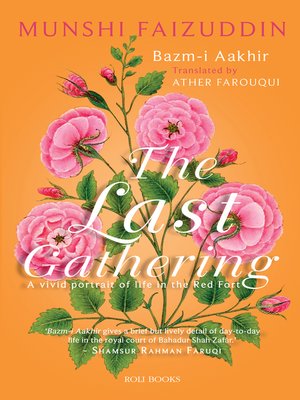Bazm-i Aakhir
ebook ∣ The Last Gathering--A vivid portrait of life in the Red Fort
By Munshi Faizuddin

Sign up to save your library
With an OverDrive account, you can save your favorite libraries for at-a-glance information about availability. Find out more about OverDrive accounts.
Find this title in Libby, the library reading app by OverDrive.



Search for a digital library with this title
Title found at these libraries:
| Library Name | Distance |
|---|---|
| Loading... |
Ather Farouqui is a pioneering scholar of Urdu language and education. He was conferred the prestigious Sahitya Akademi Award in 2012 for his Urdu and Hindi translations of Sons of Babur (Babur ki Aulad), an English play by Salman Khurshid. Farouqui's academic focus lies on aspects of Urdu, Urdu-related politics, as well as Muslims in contemporary India. One of his notable publications include the translation of The Life and Poetry of Bahadur Shah Zafar. He also edited Muslims and Media Images: News versus Views and Redefining Urdu Politics in India. His most recent publication, Delhi in Historical Perspectives, is a translation of essays on the historical and cerebral cultural life of the capital city by medieval Indian historian Professor K.A. Nizami. These days Farouqui is translating books of the nineteenth and early twentieth century related to the politics of the time and the syncretic culture of Delhi which evolved as a synthesis of over many centuries and synthesized innumerable regional influences from across the country.|First published in 1885, Bazm-i Aakhir, or The Last Gathering is a rich and lively first-hand account of life in the royal court of the last Mughal emperor in Red Fort, Bahadur Shah Zafar. From meticulous details of the day-today happenings inside the fort-palace and the royal protocols, to the celebration of festivals such as Eid, Navroz, Diwali, and even Rakshabandhan, this gives us a glimpse into the Delhi of the early nineteenth century.







